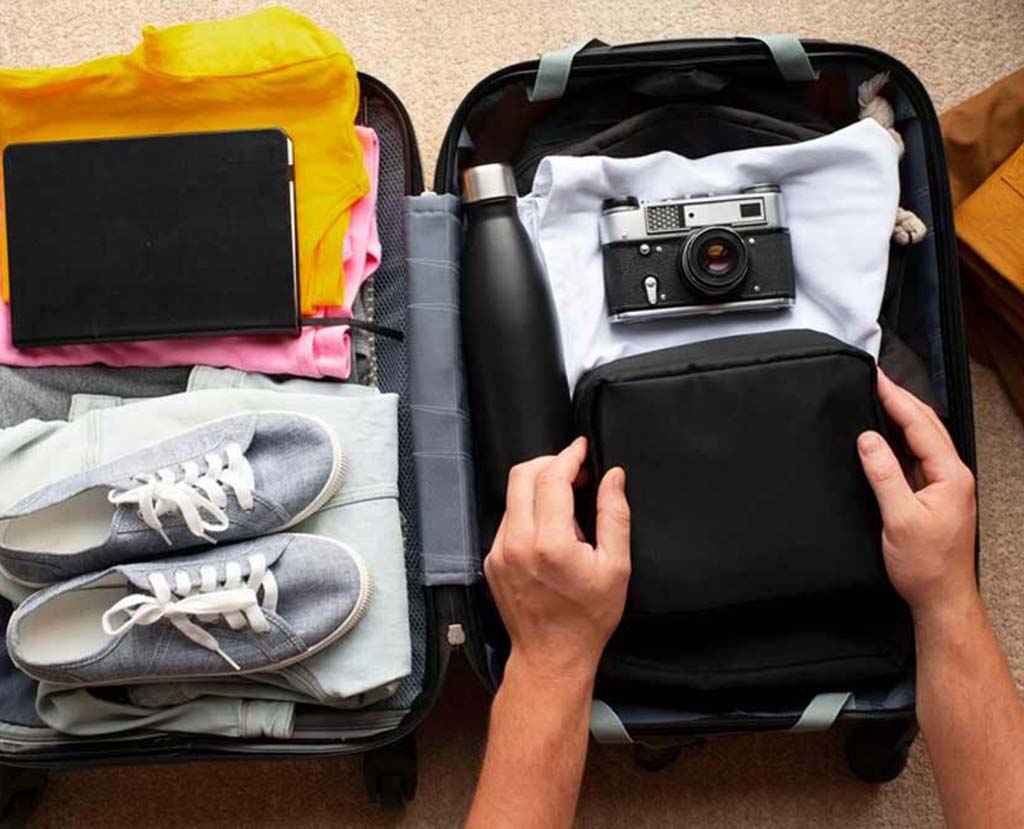Essential Travel Items:
Versatile Wardrobe:
Switzerland experiences varying climates based on seasons and regions. Packing versatile clothing is essential. For the warmer months, lightweight clothing, comfortable walking shoes, and a hat are recommended. During the colder seasons, such as winter, thermal wear, a warm coat, gloves, scarves, and sturdy waterproof boots become crucial, especially if visiting mountainous areas.
Layering Strategy:
Layering is key to adapt to changing weather conditions. Having multiple layers like thermal shirts, sweaters, and a waterproof outer shell allows you to easily add or remove clothing as temperatures fluctuate throughout the day.
Universal Power Adapter: Useful for Charging Devices
Swiss Power Outlets:
Swiss power outlets are Type J, featuring three round prongs. A universal power adapter allows travelers to charge their electronic devices without compatibility issues. It’s advisable to carry a compact adapter with multiple USB ports for convenience.
Charging Essentials:
Besides the adapter, a portable charger or power bank is handy for long days out exploring when access to power outlets might be limited.
Travel-Sized Toiletries: Convenience During Travel
Compact Toiletry Kits:
Travel-sized toiletries, including shampoo, conditioner, body wash, and toothpaste, are convenient for shorter trips. Toiletry kits that comply with airport security regulations make passing through security checks hassle-free.
Minimized Packing:
Choosing travel-sized toiletries helps save space in your luggage and ensures you comply with airline restrictions on liquid volumes in carry-on bags.
Travel Documents: Passport, Visas, ID, and Travel Insurance

Passport and Valid Identification:
A valid passport is essential for entry into Switzerland. Additionally, carrying a secondary form of identification like a driver’s license or ID card is recommended.
Visas and Travel Insurance:
Check the Swiss visa requirements based on your nationality. Travel insurance that covers medical emergencies, trip cancellations, and lost luggage is indispensable. Keep these documents in a secure place, preferably in a travel wallet or a waterproof pouch.
Appropriate Attire:
Seasonal Variations:
Switzerland experiences diverse weather conditions based on the time of year and geographical location. Summers can be warm and pleasant, while winters can bring cold temperatures, especially in the mountainous regions. It’s essential to check the weather forecast for the specific regions you plan to visit to prepare accordingly.
Clothing Recommendations:
Comfortable Footwear:
For walking tours and exploring cities or hiking trails, comfortable shoes are a must. Sneakers or walking shoes with good support are ideal for most activities. In snowy or colder conditions, consider waterproof boots with a good grip to navigate icy paths.
Layering for Versatility:
Pack clothing that can be layered to adapt to changing temperatures. Bring lightweight clothing such as T-shirts, shorts, and light pants for warmer days. For cooler weather, pack sweaters, thermal layers, a warm jacket, gloves, and a hat. A waterproof outer layer is beneficial year-round, especially in mountainous regions where weather can change quickly.
Rain Gear:
Switzerland can experience intermittent rainfall throughout the year. Carrying a compact, packable waterproof jacket or an umbrella is advisable, even during summer months.
Mountain Attire:
If planning to explore high-altitude areas or indulge in winter sports, consider specialized gear such as insulated jackets, snow pants, goggles, and waterproof gloves. Skiing and snowboarding gear can be rented at most alpine resorts if needed.
Local Weather Conditions:
- Seasonal Weather Overview: Best times to visit based on weather preferences.
- Climate Tips: What to expect in different regions and seasons.
Cultural Aspects:
- Respecting Local Customs: Etiquette, greetings, and cultural norms.
- Language Tips: Basic phrases in Swiss German, French, Italian, or Romansh.
Travel Gear:
Packing Essentials:
Backpack or Daypack:
A versatile backpack or daypack is ideal for carrying essentials during day trips, city explorations, or hikes. Ensure it’s comfortable and spacious enough to hold your belongings.
Camera or Smartphone:
Capture the stunning Swiss landscapes and memorable moments. Bring a quality camera or utilize a smartphone with a good camera for convenient photography.
Portable Charger and Adapters:
Keep your devices powered throughout the day with a portable charger. Adapters are essential for charging your electronic devices, especially if the plug types differ from your home country.
Travel-Sized First Aid Kit:
Include basic medications, bandages, antiseptic wipes, and any prescription medications in a compact first aid kit for unexpected situations.
Travel Gadgets:
GPS Navigation Device or Apps:
A GPS navigation system or smartphone app with offline maps can be incredibly useful, especially when exploring remote areas or hiking trails.
Language Translation Apps:
Download language translation apps or carry a pocket phrasebook to help communicate with locals. This can be particularly handy in regions where English may not be widely spoken.
Travel Adapters and Converters:
Ensure you have the necessary adapters or converters for charging electronic devices and appliances based on the local power outlets.
Portable Wi-Fi Hotspot:
Consider a portable Wi-Fi hotspot device or a SIM card with data for continuous internet access while exploring Switzerland.
Currency Exchange Tips:

Swiss Franc (CHF):
The official currency in Switzerland is the Swiss Franc (CHF). It’s advisable to have some Swiss Francs on hand for small purchases and transactions.
ATMs and Card Usage:
ATMs are widespread and accessible in cities and towns. Credit and debit cards (Visa and Mastercard) are widely accepted in most establishments, but it’s always wise to carry some cash for smaller shops or rural areas.
Exchange Rates:
The exchange rate can vary and may be better in certain places. Consider exchanging currency at banks or reputable currency exchange offices to get competitive rates.
Financial Management:
Budgeting Tips:
Switzerland is known for its high cost of living. To manage expenses, plan a daily budget that includes accommodation, meals, transportation, and activities. Take advantage of free attractions, walking tours, and outdoor activities.
Cost-Saving Options:
Consider staying in budget accommodations like hostels or guesthouses. Utilize public transportation passes or discount cards, like the Swiss Travel Pass, offering unlimited travel on trains, buses, and boats, along with free admission to many museums and attractions.
Dining and Food Budget:
Eating out in Switzerland can be expensive. To save on food costs, consider having meals at local markets, opting for takeaways, or preparing some meals yourself if staying in accommodations with kitchen facilities.
Local Sim Cards and Data Plans:
Buying a local SIM card with a data plan can be cost-effective for staying connected. Major providers like Swisscom, Sunrise, and Salt offer prepaid SIM cards with various data options.
Insurance Recommendations:
Obtaining travel insurance is highly recommended for any unforeseen emergencies, including medical coverage, trip cancellation, or baggage loss/delay.
Using Public Transportation:
- Navigating Swiss Transport: Trains, buses, trams.
- Ticketing and Maps: How to purchase tickets and read transport maps.
Local SIM Card Acquisition:
- Mobile Network Stores: Visit stores of major Swiss mobile network operators like Swisscom, Sunrise, and Salt. They have outlets in most towns and cities, including at airports and train stations.
- Retailers and Convenience Stores: Larger electronic retailers, supermarkets, and convenience stores often sell SIM cards. You might find them at places like MediaMarkt, Coop, or Migros.
- Kiosks and Newsstands: Some kiosks and newsstands in cities might sell SIM cards, especially in tourist areas.
Data Plans and Network Coverage Information:
Swisscom: Known for its extensive coverage, Swisscom offers 4G/LTE speeds across most parts of Switzerland. They provide various prepaid SIM card options with different data packages.
Sunrise: Sunrise also offers good coverage in urban areas, and its prepaid SIM cards come with competitive data plans suitable for travelers.
Salt: Salt provides decent coverage in populated areas and offers prepaid SIM cards with flexible data options.
Before purchasing a SIM card, compare the available data plans, rates, and network coverage to find the best option that suits your needs during your stay in Switzerland. Always ensure that your phone is unlocked to use a different SIM card.
Planning a Swiss Itinerary:
- Sample Itinerary: Suggestions for a 5-7 day travel plan, including cities, scenic spots, and cultural experiences.
Safety Tips and Precautions:
- Safety Guidelines: Advice on staying safe while exploring Switzerland.
Recommended Day Trips:
- Popular Excursions: Highlighting must-visit places for day trips from major cities.
Insurance Suggestions:
- Travel Insurance: Importance and recommendations based on personal experiences.


